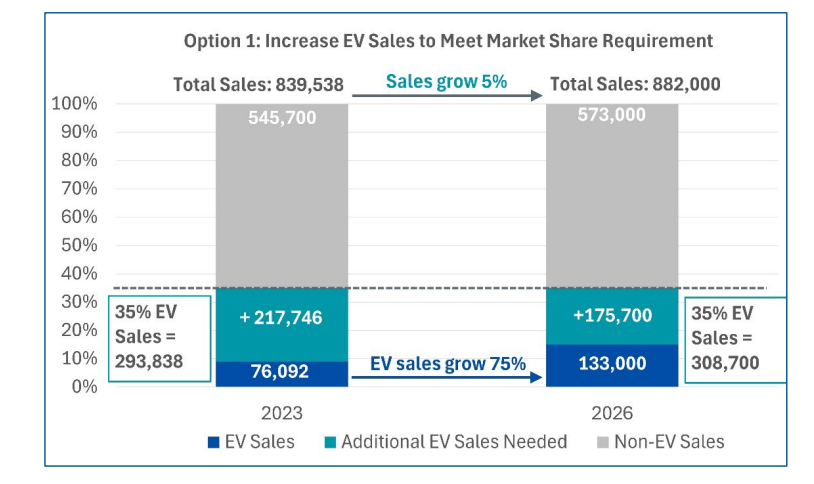The Ongoing Battle: Car Dealerships Resist EV Sales Mandates

Table of Contents
Financial Concerns and Infrastructure Challenges
Dealerships often cite significant financial hurdles as the primary reason for their resistance to EV sales mandates. These concerns center around profit margins and the substantial investments required to support EV sales and service.
Profit Margins and Investment Costs
One major obstacle is the perceived lower profit margins on EVs compared to gasoline-powered vehicles. The higher initial cost of EVs impacts consumer affordability and thus dealer sales volume. This is compounded by the lack of government support for dealership infrastructure upgrades, leaving dealers to shoulder the burden of significant upfront investment. Uncertainty around long-term EV market growth further affects investment decisions, making it a risky proposition for many dealerships.
- Higher initial cost of EVs: This impacts consumer affordability, leading to lower sales volume for dealerships.
- Lack of government support: Insufficient funding for charging station installation and other necessary infrastructure upgrades places a financial strain on dealerships.
- Uncertainty around long-term EV market growth: This makes it difficult for dealerships to justify significant investments in EV infrastructure and training.
Lack of Technician Expertise
Repairing and maintaining EVs requires specialized knowledge and tools, representing another significant financial challenge. The current workforce often lacks the necessary skills to service electric vehicles effectively. This necessitates significant investment in technician training and equipment, which many dealerships are hesitant to undertake without sufficient government support or guarantees of sufficient EV sales volume.
- Need for government-funded training programs: Targeted programs are crucial to upskill the existing workforce and prepare technicians for the demands of EV maintenance.
- Shortage of qualified EV technicians: This leads to longer repair times, potentially increased customer dissatisfaction, and higher repair costs.
- Potential for increased warranty claims: Lack of expertise can result in more warranty claims, impacting dealership profitability.
Resistance to Change and Business Model Disruption
The resistance to EV sales mandates is also rooted in the disruption of established business practices and the challenges of adapting to a new market reality.
Established Business Practices
Dealerships are accustomed to a business model centered around the sale of gasoline vehicles and their associated services. The shift to EVs necessitates a complete overhaul of their sales, service, and marketing strategies. This transition requires significant investment in new technology, training, and marketing campaigns focused on educating consumers about the benefits and features of electric vehicles.
- Resistance to adopting new sales and marketing techniques: Traditional sales strategies may not be effective for EVs, requiring a shift in mindset and approach.
- Concerns about the impact of reduced service revenue: EVs require less frequent maintenance, potentially impacting a significant revenue stream for dealerships.
- Difficulty in managing inventory and supply chain: The EV market is still developing, creating challenges in managing inventory and supply chain logistics.
Consumer Perception and Education
Dealerships play a vital role in educating consumers about new technologies. The transition to EVs requires addressing consumer concerns regarding range anxiety, charging infrastructure, and battery life. Overcoming these concerns requires comprehensive education campaigns and proactive strategies to build consumer trust and confidence.
- Need for comprehensive consumer education campaigns: These campaigns should address common misconceptions and highlight the benefits of EV ownership.
- Addressing consumer misconceptions: This involves tackling issues such as range anxiety and charging infrastructure limitations.
- Lack of public awareness regarding government incentives and subsidies: Dealerships need to educate consumers about available incentives to encourage EV adoption.
The Role of Government Policy and Incentives
Government policy plays a critical role in shaping the transition to EVs. A balanced approach that combines mandates with adequate support is crucial to overcoming dealership resistance.
Balancing Mandates and Support
Governments need to find a delicate balance between imposing EV sales mandates and providing sufficient support to dealerships. This support should include financial incentives, infrastructure development, and comprehensive training programs. A phased implementation of EV sales mandates would allow dealerships time to adapt gradually, mitigating the immediate financial shock.
- Phased implementation of EV sales mandates: This allows dealerships to adapt to the changes gradually, reducing the immediate financial burden.
- Providing tax breaks and subsidies: This can incentivize dealerships to invest in EV infrastructure and encourage consumers to purchase electric vehicles.
- Collaborating with dealerships to develop effective training programs: This will equip technicians with the necessary skills to service EVs effectively.
Market Competition and Innovation
The resistance to EV sales mandates also underscores the need for increased market competition and technological innovation. Increased competition will drive down prices and improve technology, making EVs more attractive to both consumers and dealerships.
- Encouraging competition among EV manufacturers: This will lead to more affordable and technologically advanced electric vehicles.
- Investing in research and development: This will improve EV technology, range, and charging infrastructure.
- Promoting the development of innovative charging infrastructure: This will address consumer concerns regarding range anxiety and charging convenience.
Conclusion
The resistance of car dealerships to EV sales mandates reflects a complex interplay of financial concerns, technological challenges, and established business practices. Successfully navigating this ongoing battle requires a strategic approach that addresses these concerns and fosters collaboration between governments, manufacturers, and dealerships. Addressing the concerns of dealerships through targeted support and incentives is critical to overcoming resistance and accelerating the adoption of EVs. Finding a balance between implementing effective EV sales mandates and supporting dealerships in adapting to this new reality is crucial for the successful widespread adoption of electric vehicles and the future of sustainable transportation. Ultimately, a collaborative and supportive approach is key to the success of EV sales mandates and the broader transition to electric mobility.

Featured Posts
-
 The Long Walk Movie Trailer Adaptation Of Stephen Kings Dark Novel
May 08, 2025
The Long Walk Movie Trailer Adaptation Of Stephen Kings Dark Novel
May 08, 2025 -
 Daily Lotto Result Wednesday 16th April 2025
May 08, 2025
Daily Lotto Result Wednesday 16th April 2025
May 08, 2025 -
 Xrps Potential Record High Analyzing The Grayscale Etfs Influence
May 08, 2025
Xrps Potential Record High Analyzing The Grayscale Etfs Influence
May 08, 2025 -
 Missed Dwp Mail Understanding The 6 828 Risk To Your Benefits
May 08, 2025
Missed Dwp Mail Understanding The 6 828 Risk To Your Benefits
May 08, 2025 -
 110 Potential Why Billionaires Are Investing In This Black Rock Etf
May 08, 2025
110 Potential Why Billionaires Are Investing In This Black Rock Etf
May 08, 2025
